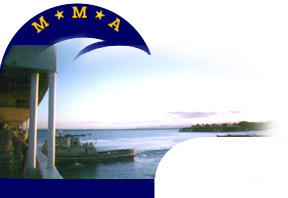
Captain's Log for Friday, 11 February 2000
|
As of 0700 Eastern Standard time, 1200 GMT and 1100 ship time, the Empire State was underway from Barcelona, Spain and enroute to Buzzards Bay, Massachusetts. She was located at 35 degrees 49 minutes North Latitude, 025 degrees 13 minutes West Longitude, steering course 250 degrees true at 15.5 knots. That position put her approximately 71 nautical miles south of the island of Santa Maria, Acores. The weather was partly cloudy with winds out of the west northwest at 6 knots. Barometric pressure was 1034 millibars. The air temperature was 64 degrees and the sea water temperature was 61 degrees. The depth of water beneath the keel was 2000 fathoms. CAPTAIN'S LOG Talk about developing confidence in each other! I just returned from the mess decks and passed the Third Mate who had just been relieved of watch. He was headed to his stateroom with his lifejacket on. Inquisitively, I asked why, but I should have known. He was communicating. When his relief reported to the Bridge, the Third Mate was wearing survival gear. In this "show me" environment he was jokingly telling his watch relief, Mr. Tim Brady, that he had no faith in his skills and intended to sleep in the life jacket as a precautionary measure. I am certain that his demonstrative action was retribution for salvos of Brady's humorous barbs delivered earlier in the Sea Term. I openly encourage the cadets and crew to have fun because learning to joke with one another and laugh at one's self is essential to morale out here. While being at sea is work, having fun is also important. We try very hard to help the cadets identify the appropriate time and place. Complacency is dangerous. Once a ship is infected with it, tragedy is not far off and ship's humor in controlled doses is an excellent antidote for the boredom that results from performing the same routine day after day. Another appropriate antidote for the "idle hands syndrome" is HARD WORK and we know how to apply that cure effctively too. As most know by now, the cadets are divided into three sections and sequentially rotate through the Sea Term curriculum. Maintenance is the toughest phase, physically and mentally and I want to tell you about it today. Inexperienced, freshmen cadets often view this important requirement as little more than drudgery and many of my student readers might be initially inclined to see maintenance in a bad light as well. However, the freshmen viewpoint radically changes as the sea term progresses and they experience the simple way of life at sea. Many in the WorldWide classroom might learn to see things differently too. During the maintenance period cadets are assigned to fix everything imaginable; they accomplish planned maintenance on equipment through out the ship, they complete superstructure repair and preservation and they are relied upon for a variety of other critical housekeeping chores in nearly every shipboard space. This section of people is very visibly as they wash dining tables, scrub pots and pans, clean berthing compartments, swab decks and passageways and as they prepare mountains of ship's trash and garbage for disposal. In general terms, they work shifts to keep the place clean, neat, and squared away for everyone else aboard. The hard work quite handily dispels any notion of this being a "cruise" experience and the type of work can be humbling, especially for someone who has never shared so much as a light switch in his or her young life. But that isn't a bad thing. Knowing how to care for nearly six hundred people is useful knowledge but knowing how to get along with those same people and thrive in this congested environment with them is golden. Doing for others teaches respect for others. So, somewhere between the first week in the scullery and the last week at the trash compactor, the thinking of most cadets matures. I see them begin with the very hard-nosed, "what goes around comes around" point of view and finish with the more prudent and fulfilling "do unto others" perspective. So you see, maintenance epitomizes our "Learn -Do- Learn" mantra as it teaches elementary philosophy, thoroughly cleans the ship, and routs complacency. What more could one ask...See you tomorrow. QUESTIONS FOR MONDAY 14 FEBRUARY 2000 GEOGRAPHY: There are four points on a compass. These four points are at the top, bottom, right and left sides of the compass. What are they called? SCIENCE: The Empire State is on her way home and has not seen land since leaving Gibraltar. They are clearly travelling over a lot of ocean. What percentage of the world's surface is water? What percent of this water is saltwater, fresh water, and ice? HISTORY: The Empire State is traveling almost the same route across the Atlantic Ocean as the Mayflower sailed. In what year did the Mayflower carry the Pilgrims from England to Plymouth, Massachusetts, and what was their original destination? MATH: The baker aboard Empire State makes 20 dozen muffins per day. If the Empire State takes 12 days to cross the Atlantic, how many muffins will the chef have to make? ANSWERS FOR FRIDAY 11 FEBRUARY 2000 GEOGRAPHY: Spain. SCIENCE: Bioluminescence HISTORY: 1002 MATH: 100 nautical miles. 86.84 hours statute miles.
|
|
||||||||||||||||||||||||||||||||||||||||||||||||||